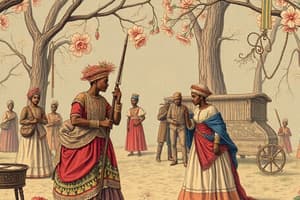Podcast
Questions and Answers
What was the outcome of the Dred Scott Decision in 1857?
What was the outcome of the Dred Scott Decision in 1857?
- Enslaved people were not citizens and had no right to sue in federal court, and slave owners could take their 'property' anywhere without fear of being deprived of it. (correct)
- Slave owners could not take their 'property' into free territories.
- Slavery was prohibited in all territories and states.
- Enslaved people were declared citizens with the right to sue in federal court.
What was the result of the fraudulent voting by pro-slavery Missourians in Kansas in 1855?
What was the result of the fraudulent voting by pro-slavery Missourians in Kansas in 1855?
- The recognition of Kansas as a free state.
- The establishment of a single, anti-slavery state government.
- The abolition of slavery in Kansas.
- The establishment of two rival state legislatures in Kansas. (correct)
What was the main consequence of the Kansas-Nebraska Act of 1854?
What was the main consequence of the Kansas-Nebraska Act of 1854?
- The establishment of a new, stricter Fugitive Slave Act.
- The overturning of the Compromise of 1820. (correct)
- The prohibition of slavery in all territories.
- The immediate abolition of slavery in the United States.
What was the effect of the Kansas-Nebraska Act on the Compromise of 1850?
What was the effect of the Kansas-Nebraska Act on the Compromise of 1850?
What was the outcome of the election of 1860?
What was the outcome of the election of 1860?
What was the result of the violence between pro-slavery and anti-slavery groups in Kansas?
What was the result of the violence between pro-slavery and anti-slavery groups in Kansas?
Flashcards are hidden until you start studying
Study Notes
-
The Compromise of 1850 temporarily calmed down the regional division over slavery in America, but ultimately failed to solve the problem.
-
The Kansas-Nebraska Act of 1854 proposed that the Kansas and Nebraska territories decide by popular sovereignty whether to allow slavery or not, which enraged Northerners and led to violence in Kansas.
-
The Kansas-Nebraska Act effectively overturned the Compromise of 1820, which prohibited slavery in territories north of the 36°30' line.
-
Violence between pro-slavery and anti-slavery groups in Kansas, known as Bleeding Kansas, continued on and off for several years.
-
In 1855, fraudulent voting by pro-slavery Missourians led to the establishment of two rival state legislatures in Kansas.
-
President Franklin Pierce recognized the pro-slavery government as legitimate, further dividing the region.
-
The Dred Scott Decision of 1857 ruled that enslaved people were not citizens and had no right to sue in federal court, and that slave owners could take their "property" anywhere without fear of being deprived of it.
-
The Dred Scott Decision effectively opened all territories and states to slavery, further increasing national tension.
-
The election of 1860 would be a crucial step towards the Civil War, as the boiling national anger over slavery affected the political parties.
-
The Whig Party was weakened by internal divisions over slavery, and the Democratic Party gained strength as a regional, pro-slavery party.
-
The Republican Party was formed in 1854, gathering together a diverse group of anti-slavery factions, including abolitionists, free soilers, and Conscience Whigs.
-
The Republicans did not advocate for the abolition of slavery but argued that it should not spread into new territories, which was seen as a threat to the institution of slavery by Southern Democrats.
Studying That Suits You
Use AI to generate personalized quizzes and flashcards to suit your learning preferences.




